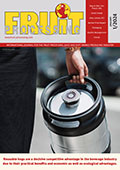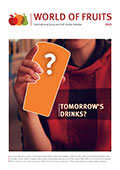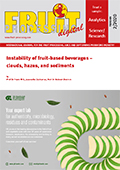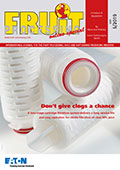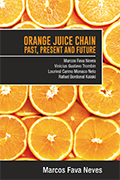Report on the IFU Technical Workshop in Cologne
The IFU Technical Workshop this year was held by the Rhine in the famous cathedral city of Cologne (Germany), which is also well known for its trade fairs. The date and location were chosen so the workshop could be held just before the Anuga Tec fair to which complimentary access was granted for all workshop […]
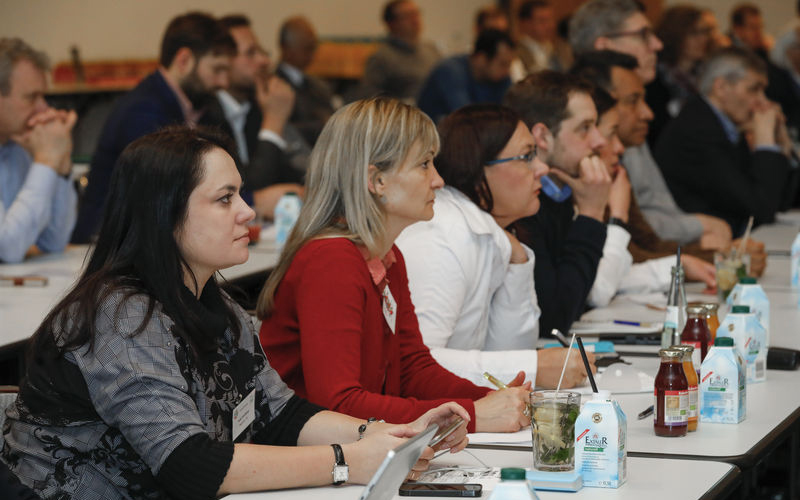
The IFU Technical Workshop this year was held by the Rhine in the famous cathedral city of Cologne (Germany), which is also well known for its trade fairs. The date and location were chosen so the workshop could be held just before the Anuga Tec fair to which complimentary access was granted for all workshop participants. Anuga Tec is a leading global food fair where industry provides innovations and technological visions attracting 50,000 visitors from 152 countries.
Dirk Lansbergen, IFU President and Citrosuco, welcomed an International audience from not only Germany, but also Australia, Austria, Belgium, France, Greece, Israel, Italy, Mexico, the Netherlands, Portugal, Spain, Russia, South Africa, Switzerland, Taiwan, Turkey and the UK. GfL were thanked for their sponsorship of the networking evening, SIG for providing the water plus Valensina and Rabenhorst for a quality selection of juices and smoothies.
The workshop opened with two contrasting presentations on organic and conventional agriculture. Boris Voelkel is the 4th generation family member of an organic juice company – Voelkel. With such a strong organic tradition and expertise Boris gave a passionate case for supporting organic products explaining how increasing consumer driven demand will make a great contribution to a sustainable future. The integrated farm assurance scheme of Global Gap was then described by Tanja Schmidt of Global Gap. It is the international standard leading to certification. The risk based critical control points and compliance criteria were shown which if applied provides a good system for the use and management of crop treatments.
Vegetable juices and purees are becoming popular, both as a product on their own or blended with other fruit juices. Mia Schellekens of SVZ explained these trends with some newly launched product examples and then followed on with an explanation of the vegetable puree and juice manufacturing process highlighting the technological challenges faced and how they are addressed.
Rheology is the science of deformation and flow of matter. This is important to the juice industry as viscosity affects product flow through equipment, heat transfer and organoleptic experience. Dr. Antonio Trifiro from the Stazione Sperimentale Parma gave the workshop a thorough understanding of the science including factors affecting rheology and measurement.
The traditional technique used to assess the soundness of tomatoes used to make tomato juices and pastes is the Howard Mould Count. Dr. Achim Gessler of rhia-Wessergold showed that the measurement of ergosterol is a new alternative application that has been incorporated into the AIJN Code of Practice and an IFU Method of Analysis has also been published. Isotopic determination can be used to detect added sugar in juices and added water in NFC juices. These principles were explained by Dr. Ana Cabanero Ortiz from the Spanish Ministry of Agriculture and Fisheries and data on the isotopic measurement of water in Spanish NFC juices were shared with the audience. Continuing with the analytical theme Dr. Detlef Jensen of Thermo Fisher Scientific provided information how ion chromatography can be used for the analysis of juices. It is particularly useful for the detection and measurement of anions, organic acids, cations, amines and carbohydrates. Systems and chromatograms were shown.
The IFU microbiological working group has been developing a revised method for the detection of alicyclobacillus sp. The changes were reviewed, the validation process outlined, and initial results presented by Barbara Gerten from Merck and Antonino Deban Valles formerly from Neogen Europe. The data validation data looks good, but the experts prefer to wait until July before publishing the final version of the method.
Markus Jungen of the SGF returned to the theme of risk-based quality management in the global juice industry and how the SGF is fighting food fraud. He showed how SGF can support company’s food fraud vulnerability assessment and control program. Extensive data was shared summarising the samples taken for analysis and the results obtained.
Oxygen has a significant affect on the shelf life of oxygen sensitive products in aseptic cartons. Sonja Bischoff from SIG explained oxygen tolerance testing and how it can be used in shelf life determination. Orange juice quality parameter data over the products shelf life data was shared for a range of different quality parameter highlighting how the test can be applied.
Biofortification has been a topic of discussion at codex recently. Dr. Gordon McDougall of the James Hutton Institute gave the concluding workshop presentation on the health benefits of berries: Enhancing bioactive content in fruit juices. The health benefits of a range of berries from their polyphenol content were shown. Genetic/genomic advances have produced markers for the accelerated breeding of new varieties with enhanced polyphenol content.
The workshop concluded with special thanks to the Aintzane Esturo of SGF for their contribution to organising the event.
A casual networking evening took place at the Hoelnerstall near the city centre. Many glasses of Kölsch were enjoyed and a special presentation was made to Prof. Helmut Dietrich who retired as Chair of the Science and Technology Commission. He was thanked for his dedicated work for the IFU, though we are pleased that he will continue to participate in future commission meetings.
A technical tour was again organised the following day. The first stop was at the well renowned Rabenhorst juice company, which is over 200 hundred years old. The group were able to see at first-hand how juices are processed, bottled and packaged as well as sampling and enjoying their range of healthy juice products.
Afterwards the SIG Combibloc kindly provided a buffet lunch before showing how juice cartons are printed and laminated along with a demonstration of filling equipment that utilises the packaging format. One satisfied participant commented “It was a very informative tour conducted by passionate employees of SIG Combibloc who were very knowledgeable about their products and applications”.
Post workshop survey.
Once again, we received very favourable feedback through the survey monkey and some great ideas for future workshop topics. All those who completed the survey were entered in a draw for a free 2019 workshop ticket. The winner was Yuval Ghendler, congratulations Yuval!



